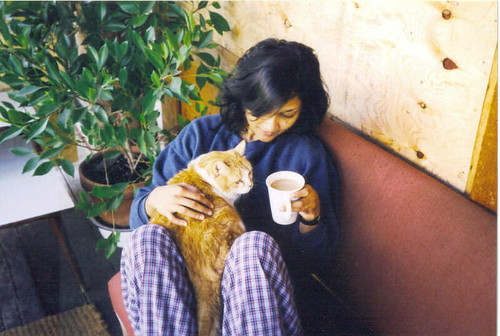Presence by Amy Cuddy
Presence
Bringing your Boldest Self to your Biggest Challenges
 by Amy Cuddy
by Amy Cuddy
Have you ever been in a situation where you had to present your strongest and most confident self -- like a job interview, or a business presentation, or a competitive athletic event, or your thesis defence? The very moments that demand your best also cause anxiety and self-doubt, making you feel powerless, leading you to walk away with regret, wishing you could have done better.
Many of us approach life’s biggest moment with dread, muddle through it feeling ineffective, and walk away from it dissatisfied at our own shortcomings. We all suffer from ‘Impostor Syndrome’ that convinces us that we don’t measure up. In Presence, Harvard Business School professor Amy Cuddy expands on her popular TED talk about adopting confident body postures, or ‘power poses,’ to bring your best self to social and professional situations.
Instead of just a collection of poses to practice in front of a mirror, the author takes us on a journey of self-discovery to learn to nurture our authentic selves, to overcome the damage that Impostor Syndrome inflicts on us, and finally to try some practical approaches to feeling personal power in order to take control of the challenging situations we might find ourselves in. The book collects real-life anecdotes from everyday folks who have surmounted difficult situations by being present and practising the power posture that worked for them.
What is “Presence”? We’ve all read about mindfulness, being present in the moment, bringing our authentic selves to every situation, but the author gives a simple yet accessible definition:
“Presence, as I mean it throughout these pages, is the state of feeling connected with our own thoughts, values, abilities, and emotions, so that we can better connect with the thoughts, values, abilities, and emotions of others.”
In other words, if we can train our speech and nonverbal behavior to be in tune with our beliefs, abilities, and values, we can achieve a synchronized inner state that can then reflect outwards.
Referring to psychologist William James’ body-mind theory of emotions, the author shares an assertion that struck the deepest nerve with her: “I don’t sing because I’m happy; I’m happy because I sing.” This eye-opening idea, attributed to James back in late 1800s, asserts that bodily experiences cause emotions, not the other way around. This is the basis for proposing that physical power poses can in fact alter the emotional state.
A research study shared in the book states that by adopting behaviours that emulate power and strength, the testosterone levels increase while the cortisol levels decrease, priming our mind for potential success. Much like “Fake it till you make it” principle, once you start practising expansive ‘power poses’, the biochemistry can help transform the fear and anxiety to excitement and intensity that helps us navigate the tough situation with confidence.
A few of the poses shared in the book might seem frivolous at first glance -- like, the Wonder Woman pose with arms at the hips and legs planted firmly apart -- but, by expanding our body laterally (and/or vertically) we give ourselves power to be there, to occupy that space and own it, much like dominance display in animal kingdom. Slouching and hunching, sitting with arms wrapped around the body or placed on lap makes us look small and thus makes us feel subordinate, like we don’t belong in that space, in that moment. However, the author is quick to point out how certain poses might be offensive in other cultures and cautions us to use it for our own self affirmation rather than to project superiority.
While talking about personal power, the author shares the disturbing results from a study done with kids ages 4 to 6: there is a definite strong male-power gender bias. She challenges us to change it by changing the stereotypes that our kids are exposed to: powerful poses are not exclusively masculine, and powerless postures are not necessarily feminine -- we are not encouraging women to be men with such power poses. Adopting a triumphant posture is not about competing with others but to accept one’s own strength and personal power in a given situation.
When we focus less on how others might be judging us and more on fully inhabiting the moment -- feeling neither threatened or dominant -- we are thoughtfully engaging with the present, and therefore experience personal power.
The author points out that presence is not a continual state of being but a moment-to-moment experience which we can tweak through body language, behaviour, and mind-set. The ideal effect of presence in a challenging situation, as the author puts it, is to execute your role with comfortable confidence and synchrony, and walk away with a sense of satisfaction and accomplishment, regardless of the measurable outcome. That is true personal power.
[image source: multcolib.org]
Bringing your Boldest Self to your Biggest Challenges
 by Amy Cuddy
by Amy CuddyHave you ever been in a situation where you had to present your strongest and most confident self -- like a job interview, or a business presentation, or a competitive athletic event, or your thesis defence? The very moments that demand your best also cause anxiety and self-doubt, making you feel powerless, leading you to walk away with regret, wishing you could have done better.
Many of us approach life’s biggest moment with dread, muddle through it feeling ineffective, and walk away from it dissatisfied at our own shortcomings. We all suffer from ‘Impostor Syndrome’ that convinces us that we don’t measure up. In Presence, Harvard Business School professor Amy Cuddy expands on her popular TED talk about adopting confident body postures, or ‘power poses,’ to bring your best self to social and professional situations.
Instead of just a collection of poses to practice in front of a mirror, the author takes us on a journey of self-discovery to learn to nurture our authentic selves, to overcome the damage that Impostor Syndrome inflicts on us, and finally to try some practical approaches to feeling personal power in order to take control of the challenging situations we might find ourselves in. The book collects real-life anecdotes from everyday folks who have surmounted difficult situations by being present and practising the power posture that worked for them.
What is “Presence”? We’ve all read about mindfulness, being present in the moment, bringing our authentic selves to every situation, but the author gives a simple yet accessible definition:
“Presence, as I mean it throughout these pages, is the state of feeling connected with our own thoughts, values, abilities, and emotions, so that we can better connect with the thoughts, values, abilities, and emotions of others.”
In other words, if we can train our speech and nonverbal behavior to be in tune with our beliefs, abilities, and values, we can achieve a synchronized inner state that can then reflect outwards.
Referring to psychologist William James’ body-mind theory of emotions, the author shares an assertion that struck the deepest nerve with her: “I don’t sing because I’m happy; I’m happy because I sing.” This eye-opening idea, attributed to James back in late 1800s, asserts that bodily experiences cause emotions, not the other way around. This is the basis for proposing that physical power poses can in fact alter the emotional state.
A research study shared in the book states that by adopting behaviours that emulate power and strength, the testosterone levels increase while the cortisol levels decrease, priming our mind for potential success. Much like “Fake it till you make it” principle, once you start practising expansive ‘power poses’, the biochemistry can help transform the fear and anxiety to excitement and intensity that helps us navigate the tough situation with confidence.
A few of the poses shared in the book might seem frivolous at first glance -- like, the Wonder Woman pose with arms at the hips and legs planted firmly apart -- but, by expanding our body laterally (and/or vertically) we give ourselves power to be there, to occupy that space and own it, much like dominance display in animal kingdom. Slouching and hunching, sitting with arms wrapped around the body or placed on lap makes us look small and thus makes us feel subordinate, like we don’t belong in that space, in that moment. However, the author is quick to point out how certain poses might be offensive in other cultures and cautions us to use it for our own self affirmation rather than to project superiority.
While talking about personal power, the author shares the disturbing results from a study done with kids ages 4 to 6: there is a definite strong male-power gender bias. She challenges us to change it by changing the stereotypes that our kids are exposed to: powerful poses are not exclusively masculine, and powerless postures are not necessarily feminine -- we are not encouraging women to be men with such power poses. Adopting a triumphant posture is not about competing with others but to accept one’s own strength and personal power in a given situation.
When we focus less on how others might be judging us and more on fully inhabiting the moment -- feeling neither threatened or dominant -- we are thoughtfully engaging with the present, and therefore experience personal power.
The author points out that presence is not a continual state of being but a moment-to-moment experience which we can tweak through body language, behaviour, and mind-set. The ideal effect of presence in a challenging situation, as the author puts it, is to execute your role with comfortable confidence and synchrony, and walk away with a sense of satisfaction and accomplishment, regardless of the measurable outcome. That is true personal power.
[image source: multcolib.org]
Labels: book review, non-fiction, self-help


0 Comments:
Post a Comment
<< Home